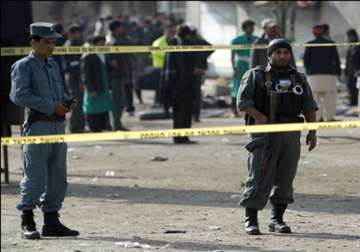Kabul, Dec 7: Twin blasts at Afghan shrines on the Shiite holy day of Ashura left at least 59 people dead on Tuesday, with most killed in a massive suicide attack in Kabul which ripped through a crowd of worshippers.
The attack in the capital, which killed 55 and wounded 134, plus a second in the northern city of Mazar-i-Sharif came the day after an international meeting in Germany on the future of Afghanistan following 10 years of war.
The Kabul blast was the deadliest strike on the capital in three years and President Hamid Karzai said it was the first time insurgents had struck on such an important religious day.
It erupted at the entrance to a riverside shrine in the city centre, where hundreds of singing Shiite Muslims had gathered to mark Ashura along with men whipping their bare backs as part of the traditional mourning ritual.
“I was there watching people mourning when there was suddenly a huge explosion,” eyewitness Ahmad Fawad said.
“Some people around me fell down injured. I wasn't hurt, so I got up and started running. It was horrible.” Men and women at the scene sobbed as they surveyed the aftermath and screamed slogans denouncing Al-Qaeda and the Taliban, an AFP photographer at the scene said.
One young girl, dressed in a green shalwar kameez smeared in blood, stood shrieking, surrounded by the crumpled bodies of slain children.
The Taliban denied responsibility for the “inhumane” attacks in Kabul and Mazar, blaming “the invading enemy”, an apparent reference to the 140,000-strong foreign force in Afghanistan.
The NATO-led International Security Assistance Force declined to address that claim directly but its commander, US General John Allen, condemned the blasts as “an attack against Islam itself.”
Afghan interior ministry spokesman Sediq Sediqqi, meanwhile, directly blamed Taliban-led insurgents while confirming the death toll.
In an almost simultaneous blast to the one in Kabul, four people were killed in Mazar-i-Sharif near the northern city's landmark Blue Mosque.
The dead people were all Shiites, killed as they walked towards the mosque to carry out mourning rituals, said provincial governor's spokesman Munir Ahmad Farhad.
When the Sunni Taliban ruled in the 1990s before being ousted by a US-led invasion in 2001, minority Shiites suffered brutal persecution, but in recent years sectarian violence has been rare.
During the 10-day Ashura ceremonies, which peaked today, Shiites beat themselves with knives and chains in religious fervour as they mark the seventh-century killing of a grandson of the Prophet Mohammed.
Shiites were effectively banned from marking Ashura in public under the Taliban.
An Afghan security official speaking on condition of anonymity said Kabul was now on high alert, with extra security forces deployed in case of any follow-up attacks.
The unprecedented strike has prompted fears of an Iraq-style increase in sectarian attacks in Afghanistan, possibly in a bid to further destabilise an already fragile Afghan state.
Latest World News

